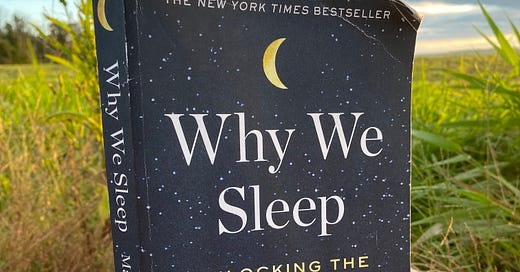Why We Sleep: Unlocking the Power of Sleep and Dreams By Matthew Walker
Explaining why we are comatose and hallucinating 6-8 hours per day.
“AMAZING BREAKTHROUGH! Scientists have discovered a revolutionary new treatment that makes you live longer. It enhances your memory and makes you more creative. It makes you look more attractive. It keeps you slim and lowers food cravings. It protects you from cancer and dementia. It wards off colds and the flu. It lowers your risk of heart attacks and stroke, not to mention diabetes. You’ll even feel happier, less depressed, and less anxious. Are you interested?” - Dr. Matthew Walker theatrically alluding to sleep’s potential health benefits.
Tripping In Bed
Have you ever thought about how weird the concept of sleeping is? In any other context, we would consider confining ourselves in a roughly 60” x 80” box where we hallucinate random events — most of which we forget — for 6-8 hours an odd or uncomfortable idea at best; yet, every night we turn off the lights, bundle up under the covers, and hop on this bizarre and near psychedelic ride. On top of the first-glance peculiarities of sleeping, phenomenons, like sleep-talking (somniloquy), sleep-walking (somnambulism), and sleep paralysis, make this event even more outlandish. So why do we do it?
“Humans are not sleeping the way nature intended. The number of sleep bouts, the duration of sleep, and when sleep occurs has all been comprehensively distorted by modernity.” - Walker contrasting our ancestors’ sleep habits with those of the modern world.
Restful Night
In his book, Why We Sleep: Unlocking the Power of Sleep and Dreams, Dr. Matthew Walker, neuroscientist and director of UC Berkeley’s Center for Human Sleep Science, dives in deep on this question. By dissecting the foundations of sleep, such as its different phases; exploring complex neuroscience topics, like the potential evolutionary basis for our need to sleep; and revealing the effects that modern activities, such as alcohol and marijuana use, have on our sleep, Walker provides insightful information for neuroscience novices and experts alike. In addition, he outlines the ways that sleep impacts the different aspects of our health; specifically, (spoiler alert!) he addresses how it impacts all of them, and why this means we should take our sleep more seriously. Through his various appearances on renowned podcasts, such as The Joe Rogan Experience and The Rich Roll Podcast, along with his work at UC Berkeley, Walker has made a name for himself as one of the world’s utmost experts in sleep science and left a significant impact on PTSD treatment, Alzheimer’s Disease research, and the public view on sleep. If you are looking for a deep dive into the bizarre phenomenon of sleep that is as entertaining as it is educational and useful, then Why We Sleep is the book for you.
“They discovered that naps as short as twenty-six minutes in length still offered a 34 percent improvement in task performance and more than a 50 percent increase in overall alertness.” - Walker detailing the power of napping.
Walking Early
I imagine that some of you might be shrugging off the importance of sleep, believing that you can sleep when you’re dead or that you’ve been doing just fine on your 6 hours every night. I understand where you are coming from because I used to endorse similar ideologies myself; particularly, I espoused this thinking in high school when I used to go to the basketball gym before school, stumble through my classes on 4-6 hours of sleep, participate in my extracurriculars, stay up late completing my homework, then rinse and repeat the next day. I defended my poor sleeping habits with phrases like, “sleep is a waste of time,” and, “I can sleep when I’m dead,”; however, in hindsight, I realize that I was actually losing time by operating suboptimally and — as Walker emphasizes — bringing myself closer to death by disregarding my sleep.
“Inadequate sleep—even moderate reductions for just one week—disrupts blood sugar levels so profoundly that you would be classified as pre-diabetic.” - Walker unearthing the dramatic effect that sleep has on the body’s ability to regulate glucose.
Clear Brain
After reading Walker’s book, I discovered that by allocating a couple of extra hours to sleep every day, as well as following a healthy and simple sleep-hygiene routine, I could boost my productivity and progress in athletics and school, while simultaneously improving my health. Whether it be following a consistent sleep schedule, avoiding bright light before bed, or properly timing my naps, following Walker’s suggestions has made a noticeable difference in my life. By engaging with his book and utilizing his tips and tricks, not only will you understand the biological conundrum that is sleep, but I think you will experience similar improvements in your health, work-life, physical performance, cognitive abilities, and emotional control.
“The second evolutionary contribution that the REM-sleep dreaming state fuels is creativity. NREM sleep helps transfer and make safe newly learned information into long-term storage sites of the brain. But it is REM sleep that takes these freshly minted memories and begins colliding them with the entire back catalog of your life’s autobiography.” - Walker describing how sleep and dreaming influence creativity and learning.




